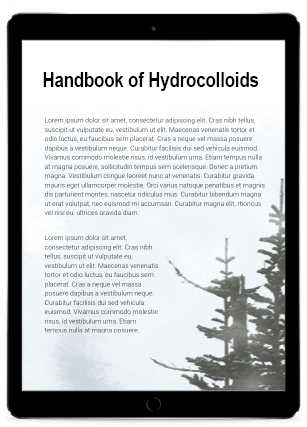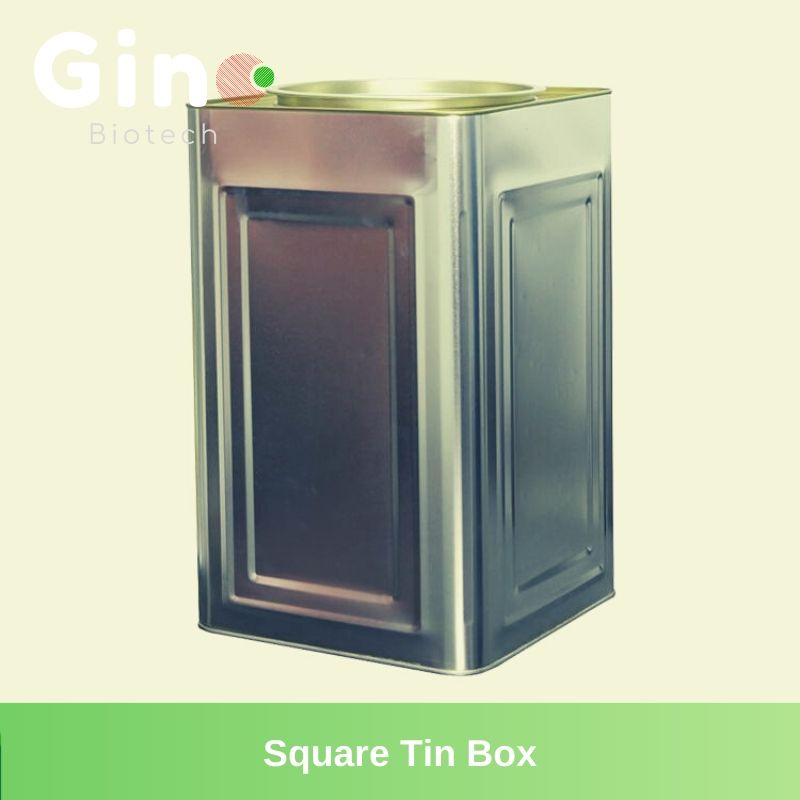Carrageenan
Carrageenan Supplier in China

Handbook of Hydrocolloids: A Guide to Carrageenan
Carrageenan, a soluble fiber & hydrocolloid derived from red seaweed, is a natural food ingredient that has been used for hundreds of years in cooking all over the world.
It often replaces synthetic and animal-based products (like Gelatin). It is also commonly used in vegetarian and vegan diets and lifestyles.
Carrageenan is used in a variety of commercial applications as gelling, thickening, and stabilizing agent, especially in food products and sauces. Aside from these functions, carrageenans are used in experimental medicine, pharmaceutical formulations, cosmetics, and industrial applications.
Leave your email to download the full PDF of Handbook of Hydrocolloids
Carrageenan Manufacturer | Carrageenan Supplier
What is Carrageenan
Carrageenan, a soluble fiber & hydrocolloid derived from red seaweed, is a natural food ingredient that has been used for hundreds of years in cooking all over the world.
It often replaces synthetic and animal-based products (like Gelatin). It is also commonly used in vegetarian and vegan diets and lifestyles.
Carrageenan is used in a variety of commercial applications as gelling, thickening, and stabilizing agent, especially in food products and sauces. Aside from these functions, carrageenans are used in experimental medicine, pharmaceutical formulations, cosmetics, and industrial applications.
What are the 3 Main Structures of Carrageenan?
-
Kappa Carrageenan = Firm Gel
-
Iota Carrageenan = Elastic Gel
-
Lambda Carrageenan = Thickener
Products We Offer
As one global carrageenan supplier from China, we only select superior products from qualified carrageenan producers and manufacturers. Gino could offer a whole range of carrageenan products as below:
Technical Data Sheet
Carrageenan Specification All In One
| Sensory Characteristics: | ||||
| It is a fine granulometry powder with a slightly off-white color and neutral odor and taste. | ||||
| Chemical And Physical Characteristics: | ||||
| Kappa Refined | Kappa Semi-Refined | Iota Refined | Iota Semi-Refined | |
| Viscosity(1.5% 75℃) | ≥ 5 mPa.s | |||
| Gel Strength(1.5%+0.2% KCL 20℃) | ≥1,300 g/cm2 | ≥450 g/cm2 | --- | --- |
| Moisture(105℃) | ≤12% | |||
| Total Ash (550℃) | 15-40% | |||
| pH (1%) | 8-11 | |||
| Sulfates | 15-40% | |||
| Acid Insoluble Ash | ≤ 1% | |||
| Acid Insoluble Matter | ≤2% | ≤15% | ≤2% | ≤15% |
| Lead (Pb) | ≤5 ppm | |||
| Arsenic (As) | ≤3 ppm | |||
| Mercury (Hg) | ≤1 ppm | |||
| Cadmium (Cd) | ≤2 ppm | |||
| Microbiological Characteristics: | ||||
| Total Plate Count | Max 5,000 CFU/g | |||
| Yeast and Moulds | Max 300 CFU/g | |||
| E.Coli | Absent in 5g | |||
| Salmonella | Absent in 10g | |||
In the Technical Data Sheet, you will find its sensory characteristics, chemical and physical characteristics, and microbiological characteristics,
so click the below button to download the full TDS of our carrageenan.
Our Carrageenan Packaging
As a responsible carrageenan supplier in China, Gino Biotech provides food systems solutions to many industries, at the same time, flexible packaging solutions could also be provided. We will help you boost your business and make you stand out from the competition by offering you custom packaging.
Contact us to customize your own packaging.
Carton Box

Fiber Drum

Tin Box

Kraft Bag

PP Woven Bag

Carrageenan Properties
Solution properties, Acid stability, Gel properties, Synergism with other gums
| Carrageenan type | Lambda | Iota | Kappa |
| Solubility | |||
| Hot (80 °C) water | Soluble | Soluble | Soluble |
| Cold (20 °C) water | All salts soluble | Sodium salt soluble | Sodium salt soluble |
| Hot (80 °C) milk | Soluble | Soluble | Soluble |
| Cold (20 °C) milk | Thickens | Insoluble | Insoluble |
Cold milk (TSPP added) | Increased thickening or gelling | Thickens or gels | Thickens or gels |
| 50% sugar solutions | Soluble | Insoluble | Soluble hot |
| 10% salt solutions | Soluble hot | Soluble hot | Insoluble |
| Gelation | |||
| Effect of cations | Non-gelling | Strongest gels with calcium | Strongest gels with potassium |
| Gel texture | Non-gelling | Soft, elastic | Firm, brittle |
| Syneresis | Non-gelling | No | Yes |
| Hysteresis | Non-gelling | 5-10 °C | 10-20 °C |
| Freeze-thaw stability | Yes | Yes | No |
| Synergy with locust bean gum | No | No | Yes |
| Synergy with konjac glucomannan | No | No | Yes |
| Synergy with starch | No | Yes | No |
| Shear reversibility | Yes | Yes | No |
| Acid stability | Hydrolysis | Hydrolysis in solution, accelerated by heat; gels are stable | |
| Protein Reactivity | Strong protein interaction in acid | Specific reaction with kappa-casein | |
Carrageenan Features
| E-No. | E 407 |
| Origin | Seaweed extract |
| Chemical composition | 1. Family of salts of sulfated galactan (high sulfate content 18–40%); 2. D-galactose, D-(3-6)-anhydro-galactose, sulfate ester groups |
| Nutritional value (in 100 g) – metabolism | 0 kJ (0 kcal); No resorption |
| Fiber content | 100% Soluble fibre |
| Toxicology | Global approval as food additives; viscosity: minimum 5 mPa s as 1.5% solution at 75 °C (167 °F) (average MW of 100 kDa); Europe: ADI (75 mg/kg BW per day) and MW limit of maximum 5% below 50 kDa |
| Solubility at low temperature (H2O) | κ-C: only Na+ salts are soluble, limited swelling of K+ and Ca2+ salts; ι-C: only Na+ salts are soluble, Ca2+ salt gives thixotropic swollen particles; λ-C: all salts are soluble in cold water |
| Appearance of an aqueous solution | Clear for pure extracts, opaque-turbid for PES |
| Viscosity of solution in water | Medium to high (hot solutions set to gels when cooling) |
| Impact of heat on viscosity in water (pH 7) | All κ-, ι-, and λ-C types are completely soluble in water and milk at T=80 °C (176 °F) |
Viscosity development in water at pH 7 (T=0–100 °C) | Complete solubility in water (or milk) at T= 80 °C (176 °F), viscosity is reduced by further heating (fully reversible at pH 7-9), solutions of κ- and ι-types set to gels upon cooling, gels are stable at room temperature, gels melt by heating and re-set upon cooling without loss of gel strength or texture in neutral conditions |
| Shear stability | Solutions are pseudoplastic (reversible shear-thinning); κ-C-gels break when sheared (irreversible); ι-C-gels break by shear, but recover and re-gel after shear stress is removed |
| Thickening effect | High |
| pH stability | Medium (pH 5.5-9) |
| Decomposition | κ-C + ι-C: hydrolysis by acid (accelerated by heat, low pH value, and time); however, gels are acid-stable; λ-C: hydrolysis in acidic systems |
| Film formation | High |
| Emulsion stabilization | High |
| Gelation | κ-C: strongest gels with K+; ι-C: strongest gels with Ca2+; λ-C: no gelation with cations (but gelling with very high salt concentrations) |
| Gel strength and gel stability | κ-C: firm brittle gels with strong syneresis, not freeze-thaw stable, hysteresis 10-20 °C (18-36 °F); ι-C: soft elastic texture, no syneresis, freeze-thaw stable; λ-C: no gels, solutions are freeze-thaw stable |
| Gel transparency | High |
| Tendency for gel syneresis | κ-C-gels: strong syneresis; ι-C-gels: no syneresis |
| Impact of electrolytes (cations +, 2+, 3+) | κ-C: strong gelation with monovalent potassium ions; ι-C: strong gelation with divalent calcium ions; λ-C: no impact |
| Reaction with Ca2+ ions | Gelation with ι-carrageenan |
| Protein activity | κ-C. forms weak gels with κ-casein in milk to stabilize neutral dairy products and particles in suspensions; ι-C. and λ-C. have a strong protein interaction in acid |
| Crystallization control | Gels of ι-C. and solutions of λ-C. are freeze-thaw stable, gels of κ-C. exhibit syneresis |
| Synergistic effects with other hydrocolloids | κ-Carrageenan forms synergistic gels (increased gel strength and elasticity, reduced syneresis) with galactomannans (e.g. LBG) and konjac glucomannan; synergism between starch and ι-carrageenan |
| Other synergistic effects | Solubility in 50% sugar solutions: κ-C. is hot-soluble, ι-C. is insoluble, λ-C. is soluble; solubility in 10% salt solutions: κ-C. is insoluble, ι-C. and λ-C. are hot-soluble |
| Negative interactions | - |
| Dosage level in foods | Low to medium (typical 0.02-3%) |
Carrageenan Advantages
Successful Additive
Carrageenan is one of the most popular and successful food additives in the world, for stabilizing, thickening, and gelling food systems.
Unique functional characteristics
It provides unique functional characteristics in food products and non-food systems.
Rich in antioxidants
Carrageenan has antioxidant activity and other properties that make it useful in health supplements.
Improve digestive system
Carrageenan influences the development of beneficial microbial communities in the digestive tract.
Lower Cholesterol Levels
Study shows that carrageenan can reduce lipid levels and blood cholesterol levels.
Carrageenan Benefits
Carrageenan plays an important and valued role in modern-day formulations providing texture, structure, and physical stability in food and non-food products.
It is also used for cost reduction and added value.
Carrageenan Applications
What are the typical applications for carrageenan?
Carrageenan can be found in a number of foods you eat every day, including yogurts, cheeses, chocolate milk and almond milk, ice cream, salad dressing, jams and jellies, hotdogs, beers, and more.
It can also be found in personal care products like toothpaste, shampoo and air fresheners, body soaps, face wash, makeup, pet food, and more.
| Application | Use level (%) |
| Hot-processed gelling applications | |
| Cake glaze | 0.60 - 0.70 |
| Cheese, imitation block | 2.20 - 2.70 |
| Cheese, imitation spread | 0.30 - 0.35 |
| Desserts, water gels (dry mix) | 0.50 - 0.80 |
| Desserts, water gels (RTE) | 0.60 - 1.00 |
| Desserts, water gels (sugar-free) | 0.60 - 0.80 |
| Entrapment or encapsulation | 1.00 - 2.00 |
| Fabricated or formed foods | 2.00 - 3.00 |
| Fish gels | 0.50 - 1.00 |
| Frozen dough | 0.10 - 0.25 |
| Fruit-in-gel | 0.80 - 1.20 |
| Ham, further processed | 0.30 - 0.50 |
| Jelly, imitation (low sugar) dry mix | 1.50 - 2.00 |
| Jelly, imitation (low sugar) RTE | 1.00 - 1.50 |
| Mayonnaise, imitation | 0.50 - 1.00 |
| Pasta | 0.10 - 0.50 |
| Petfood | 0.20 - 1.00 + LBG |
| Petfood, gravy | 0.10 - 0.20 + Guar |
| Pie filling | 0.30 - 0.50 |
| Poultry nuggets | 0.40 - 0.70 |
| Poultry, further processed | 0.25 - 0.50 |
| Red meats, further processed | 0.25 - 0.50 |
| Seafood, further processed | 1.25 - 1.75 + starch |
| Sorbet | 0.15 - 0.30 + pectin |
| Sour cream | 0.10 - 0.20 + LBG |
| Surimi or kamaboko | 0.20 - 0.30 + starch |
| Tomato sauces | 0.10 - 0.20 + starch |
| Whipped cream | 0.01 - 0.05 |
| Hot-processed thickening applications | |
| Batter mixes | 0.10 - 0.30 |
| Coffee creamer | 0.10 - 0.20 |
| Desserts, creamy whipped | 0.15 - 0.30 |
| Fruit topping | 0.30 - 0.50 |
| Mayonnaise, imitation | 0.40 - 0.60 + starch |
| Moisture barriers or meat glaze | 0.80 - 1.20 |
| Salad dressing, hot process | 0.20 - 0.50 |
| Syrups | 0.10 - 0.30 |
| Variegates | 0.30 - 0.80 + starch |
| Cold-processed thickening applications | |
| Cheesecake (no bake) | 0.60 - 1.00 |
| Fruit beverages | 0.10 - 0.20 |
| Mayonnaise, imitation cold process | 0.40 - 0.70 + xanthan |
| Salad dressing (dry mix) | 0.60 - 1.00 |
| Salad dressing (cold process) | 0.20 - 0.50 |
| Application | Use level (%) |
| Hot-processed milk thickening applications | |
| Calcium-fortified milk | 0.02 - 0.04 |
| Chocolate drink | 0.02 - 0.04 |
| Chocolate milk (HTST) | 0.02 - 0.04 |
| Chocolate milk (UHT) | 0.02 - 0.05 |
| Cottage cheese dressing | 0.01 - 0.05 |
| Cream cheese | 0.05 - 0.08 |
| Egg nog | 0.05 - 0.12 |
| Evaporated milk | 0.005 - 0.020 |
| Ice cream (hard pack) | 0.010 - 0.015 + guar/CMC/LBG |
| Ice cream (soft serve) | 0.02 - 0.03 + guar/CMC/LBG |
| Infant formula | 0.02 - 0.03 |
| Shakes (RTE) | 0.02 - 0.03 |
| Sterilized milk | 0.01 - 0.03 |
| Soy beverages | 0.02 - 0.05 |
| Hot-processed milk gelling applications | |
| Custards (dry mix) | 0.20 - 0.30 |
| Dutch vla | 0.015 - 0.045 + starch |
| Flans (dry mix) | 0.20 - 0.30 |
| Flans (RTE) | 0.20 - 0.30 |
| Flans (soy) | 0.20 - 0.30 |
| Puddings (cold fill) | 0.20 - 0.60 |
| Pumpkin pie | 0.45 - 0.55 |
| Cold-processed milk thickening applications | |
| Beverages, nutritional | 0.10 - 0.15 |
| Bread | 2.00 - 3.00 |
| Cheese spreads, sauces | 0.50 - 1.00 |
| Chocolate beverages, dry mix | 0.08 - 0.12 |
| Chocolate syrups | 0.20 - 0.40 |
| Desserts, dry mix | 0.15 - 0.20 |
| Desserts, aerated (mousse) | 0.50 - 1.00 |
| Ice cream (dry mix) | 0.50 - 0.80 |
| Meringue topping | 0.15 - 0.25 |
Kappa carrageenan with good gel properties is commonly used in confectionery. Carrageenan is a derivative of galactose, which is insoluble in cold water and gradually dissolved in hot water when heated to 60°C.
However, it is easy to be hydrolyzed in an acidic solution so that the gel force is destroyed.
However, when heated in an acidic solution, it is very easy to hydrolyze and destroy the gel force, so you should try not to use acid during the production process, or use a small amount of acid and add a buffer.
Carrageenan has a strong water absorption rate, up to 30 to 40 times, too much water in the production process will prolong the boiling time, and too little water can not fully dissolve the gelatin, which will affect the gelling ability. The general water consumption is 22 ~ 25 times that of carrageenan.
Here is the suggested carrageenan gummy candy recipe for your reference:
White Sugar: 15Kg
Starch Syrup: 35Kg
Carrageenan: 0.5Kg
Locust Bean Gum: 0.15Kg
Flavor: 60~80ml
Color: As per Req
Note: A moderate amount of fruit acid and the same proportion of buffer can also be added to the ingredients.
According to the literature, if carrageenan and locust bean gum are compounded in the ratio of 3:1 to 1:3, the strength and structure of the gel can be increased and improved, in addition to enhancing the phenomenon of overcoming dehydration shrinkage.
Contact us for more recipes
Based on years of research on carrageenan, agar, and konjac gum, and their compound products, we provide not only products but also product application solutions. Let Gino be your next long-term carrageenan supplier!
Click HereIs Carrageenan Safe?
An overwhelming body of evidence supports the conclusion that carrageenan is safe and suitable for use in food.
Regulatory authorities in every region of the world including the United States, Europe, China, Japan, and Brazil have found carrageenan safe for use in food.
Most recently, in July 2014, the Joint FAO/WHO Expert Committee on Food Additives (JECFA), “concluded that the use of carrageenan in infant formula and formulae for special medical purposes for infants up to concentrations of 1000 mg/L is not of concern”. The committee reviewed all studies, including those claiming negative effects of carrageenan, and concluded that carrageenan was safe, even for those most vulnerable in our population—infants.
In addition, experts from the World Health Organization have placed carrageenan in the best possible category for any food additive, noting it “does not in the opinion of the committee represent a hazard to health.”
The International Agency for Research on Cancer has found carrageenan to be non-carcinogenic. It also doesn’t cause inflammation of the gastrointestinal tract.
There are many well-known multinational companies and groups around the world that produce and supply carrageenan and its compounding products.
If carrageenan is not safe, then why are there more and more carrageenan suppliers?
Contact Form
Gino Biotech will always select the most reliable carrageenan producers and manufacturers, and we aim to be your best carrageenan supplier and a good partner for other hydrocolloids from China.
Testimonials
Don’t take our word for it, just hear what our satisfied customers have to say!

We import kappa carrageenan and other additives from China to Argentina every month, and we have developed a great partnership with Gino Biotech since 2016.
Their dedication to our business is evident in all steps of the orders. We appreciate their great work. Nice carrageenan supplier!
Daniel Kennedy
We are a small factory for the preparation of sausages, we selected only reliable carrageenan suppliers especially to be assured of quality and service.
No doubt Gino is a very good carrageenan supplier & partner, we will keep the long-term good relationship with them in the future.
Cherly Bansal

Related Products
Found Something Interesting?
EXPLORE YOUR RELIABLE CARRAGEENAN SUPPLIER PRODUCER MANUFACTURER TODAY!
" To bring the technical and functional hydrocolloids to the food industry. "
" To be the strategic partner and become one respected carrageenan supplier in the hydrocolloids world. "


















